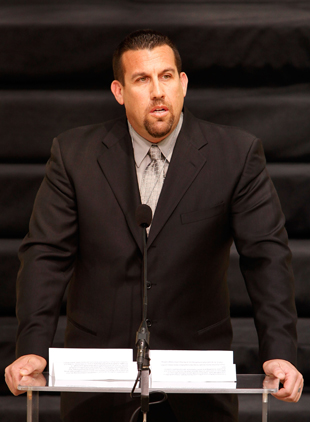Iraq's Prime Minister Nouri al-Maliki, center, walks with Rep. Eliot Engel, D-N.Y., right, and Rep. Ed Royce, R-Calif., on Capitol Hill in Washington, Wednesday, Oct. 30, 2013, before their meeting. Earlier, the prime minister met with Vice President Joe Biden. (AP Photo/Molly Riley)
Iraq's Prime Minister Nouri al-Maliki, center, walks with Rep. Eliot Engel, D-N.Y., right, and Rep. Ed Royce, R-Calif., on Capitol Hill in Washington, Wednesday, Oct. 30, 2013, before their meeting. Earlier, the prime minister met with Vice President Joe Biden. (AP Photo/Molly Riley)
Iraq's Prime Minister Nouri al-Maliki listens during a meeting with House Foreign Affairs Committee Chairman Rep. Ed Royce, R-Calif., and the committee's ranking Democrat Rep. Eliot Engel, D-N.Y., Wednesday, Oct. 30, 2013, on Capitol Hill in Washington. (AP Photo/Molly Riley)
Iraq's Prime Minister Nouri al-Maliki, left, talks with House Foreign Affairs Committee Chairman Rep. Ed Royce, R-Calif., right, during a luncheon meeting on Capitol Hill in Washington, Wednesday, Oct. 30, 2013. (AP Photo/Molly Riley)
Iraq's Prime Minister Nouri al-Maliki, left, is greeted by House Foreign Affairs Committee Chairman Rep. Ed Royce, R-Calif., center, and the committee's ranking Democrat Rep. Eliot Engel, D-N.Y., on Capitol Hill in Washington, Wednesday, Oct. 30, 2013, during a luncheon meeting. (AP Photo/Molly Riley)
WASHINGTON (AP) — A bloody resurgence of al-Qaida in Iraq is prompting Baghdad to ask the U.S. for more weapons, training and manpower, two years after pushing American troops out of the country.
The request will be discussed during a White House meeting Friday between Iraqi Prime Minister Nouri al-Maliki and President Barack Obama in what Baghdad hopes will be a fresh start in a complicated relationship that has been marked both by victories and frustrations for each side.
Al-Maliki will discuss Iraq's plight in a public speech Thursday at the U.S. Institute for Peace in Washington.
"We know we have major challenges of our own capabilities being up to the standard. They currently are not," Lukman Faily, the Iraqi ambassador to the U.S., told The Associated Press in an interview Wednesday. "We need to gear up, to deal with that threat more seriously. We need support and we need help."
He added, "We have said to the Americans we'd be more than happy to discuss all the options short of boots on the ground."
"Boots on the ground" means military forces. The U.S. withdrew all but a few hundred of its troops from Iraq in December 2011 after Baghdad refused to renew a security agreement to extend legal immunity for Americans forces, which would have let more stay.
At the time, the withdrawal was hailed as a victory for the Obama administration, which campaigned on ending the Iraq war and had little appetite for pushing Baghdad into a new security agreement. But within months, violence began creeping up in the capital and across the country as Sunni Muslim insurgents, angered by a widespread belief that Sunnis have been sidelined by the Shiite-led government, lashed out, with no U.S. troops to keep them in check.
More than 5,000 Iraqis have been killed in attacks since April, and suicide bombers launched 38 strikes in the last month alone.
Al-Maliki is expected to ask Obama for new assistance to bolster its military and fight al-Qaida. Faily said that could include everything from speeding up the delivery of U.S. aircraft, missiles, interceptors and other weapons, to improving national intelligence systems. And when asked, he did not rule out the possibility of asking the U.S. to send military special forces or additional CIA advisers to Iraq to help train and assist counterterror troops.
If the U.S. does not commit to providing the weapons or other aid quickly, "we will go elsewhere," Faily said. That means Iraq will step up diplomacy with nations like China or Russia that would be more than happy to increase their influence in Baghdad at U.S. expense.
The two leaders also will discuss how Iraq can improve its fractious government, which so often is divided among sectarian or ethnic lines, to give it more confidence with a bitter and traumatized public.
The ambassador said no new security agreement would be needed to give immunity to additional U.S. advisers or trainers in Iraq — the main sticking point that led to U.S. withdrawal. And he said Iraq would pay for the additional weapons or other assistance.
A senior Obama administration official said Wednesday that U.S. officials were not planning to send U.S. trainers to Iraq and that Baghdad had not asked for them. The administration official spoke on condition of anonymity because he was not authorized to brief reporters by name.
U.S. officials were prepared to help Iraq with an across-the-board approach that did not focus just on military or security gaps, the administration official said. The aid under consideration might include more weapons for Iraqi troops who do not have necessary equipment to battle al-Qaida insurgents, he said.
Administration officials consider the insurgency, which has rebranded itself as the Islamic State of Iraq in the Levant, a major and increasing threat both to Iraq and the U.S., the official said.
U.S. and Iraqi officials see a possible solution in trying to persuade insurgents to join forces with Iraqi troops and move away from al-Qaida, following a pattern set by so-called Awakening Councils in western Iraq that marked a turning point in the war. Faily said much of the additional aid — including weapons and training — would go toward this effort.
Sen. John McCain, R-Ariz., who opposed the U.S. troop withdrawal in 2011, said Iraq likely would not get the aid until al-Maliki, a Shiite, makes strides in making the government more inclusive to Sunnis.
"If he expects the kind of assistance that he's asking for, we need a strategy and we need to know exactly how that's going to be employed, and we need to see some changes in Iraq," McCain said Wednesday after a tense meeting on Capitol Hill with al-Maliki. "The situation is deteriorating and it's unraveling, and he's got to turn it around."
Al-Maliki's plea for aid is somewhat ironic, given that he refused to budge in 2011 on letting U.S. troops stay in Iraq with legal immunity Washington said they must have to defend themselves in the volatile country. But it was a fiercely unpopular political position in Iraq, which was unable to prosecute Blackwater Worldwide security contractors who opened fire in a Baghdad square in 2007, killing at least 13 passersby.
James F. Jeffrey, who was the U.S. ambassador in Baghdad when the U.S. troops left, called it a "turnabout" by al-Maliki. He said Iraq desperately needs teams of U.S. advisers, trainers, intelligence and counterterror experts to beat back al-Qaida.
"We have those people," said Jeffrey, who retired from the State Department after leaving Baghdad last year. "We had plans to get them in after 2011. They can be under embassy privileges and immunities. They will cost the American people almost nothing. They will, by and large, not be in any more danger than our State Department civilians. And they could mean all the difference between losing an Iraq that 4,500 Americans gave their lives for."
Nearly 4,500 U.S. troops were killed in Iraq between the 2003 invasion and the 2011 withdrawal. More than 100,000 Iraqi were killed in that time.
___
Follow Lara Jakes on Twitter at: https://twitter.com/larajakesAP
Associated PressSource:
http://hosted2.ap.org/APDEFAULT/3d281c11a96b4ad082fe88aa0db04305/Article_2013-10-31-US-United-States-Iraq/id-0954ea9a3f94497a8d32aa20195437a2Similar Articles:
homeland PS4 release date


 In that euphoric moment when a fighter who, seconds before, had been virtually out cold, rallies to win a significant bout, no one is thinking of concussions or traumatic brain injuries or
In that euphoric moment when a fighter who, seconds before, had been virtually out cold, rallies to win a significant bout, no one is thinking of concussions or traumatic brain injuries or 
 Brian Stann did the same thing in a fight last year with Alessio Sakara. Their restraint, and that of numerous other fighters who have reacted similarly when they realize the opponent is helpless, has been another factor why there haven't been any deaths or traumatic brain injuries.
Brian Stann did the same thing in a fight last year with Alessio Sakara. Their restraint, and that of numerous other fighters who have reacted similarly when they realize the opponent is helpless, has been another factor why there haven't been any deaths or traumatic brain injuries. The problem with Martin's thinking is that while someone may have made an error by not stopping a previous fight, the same error shouldn't be repeated, because there can be dire consequences to allowing a fighter to take too many blows to the head.
The problem with Martin's thinking is that while someone may have made an error by not stopping a previous fight, the same error shouldn't be repeated, because there can be dire consequences to allowing a fighter to take too many blows to the head.